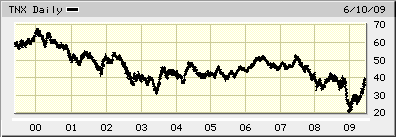The U.S. stock market has rallied six percent so far this week after second quarter earnings have thus far boosted investor confidence. The four large companies getting the most attention this week have all surpassed estimates (Goldman Sachs, Intel, Johnson and Johnson, and Yum Brands).
It is hard to paint these results with anything but a positive brush, but that has not stopped many commentators from trying to throw cold water on the initial set of earnings reports. Their core argument (which we hear all the time from the bears and really frustrates me) is that while earnings have been solid, sales have been uninspiring. "You can't cut your way to prosperity" they say, alluding to the fact that cost cuts are helping U.S. companies exceed consensus profit expectations.
I roll my eyes when I hear this logic because sales are pretty much irrelevant when valuing equities. Shareholders own a proportional claim on a company's future profits, not sales. Heck, if sales were all that mattered, the dot com bubble never would have burst and shareholders of pets.com would still be rich. The Internet bubble popped because selling dollar bills for ninety cents is not a sustainable business model. You might be able to rack up some serious sales growth that way, but the business will not survive.
Now, I do not disagree with the notion that sales have been lackluster. After all, we are in a recession so anything but weak sales would be a real surprise. Just remember that stock prices are based on earnings, not sales. As a result, if the companies I own can boost profits by cost cutting while the economy is in decline, that is fine by me. Once the recession ends, we will have plenty of time for sales growth to impress everyone.


